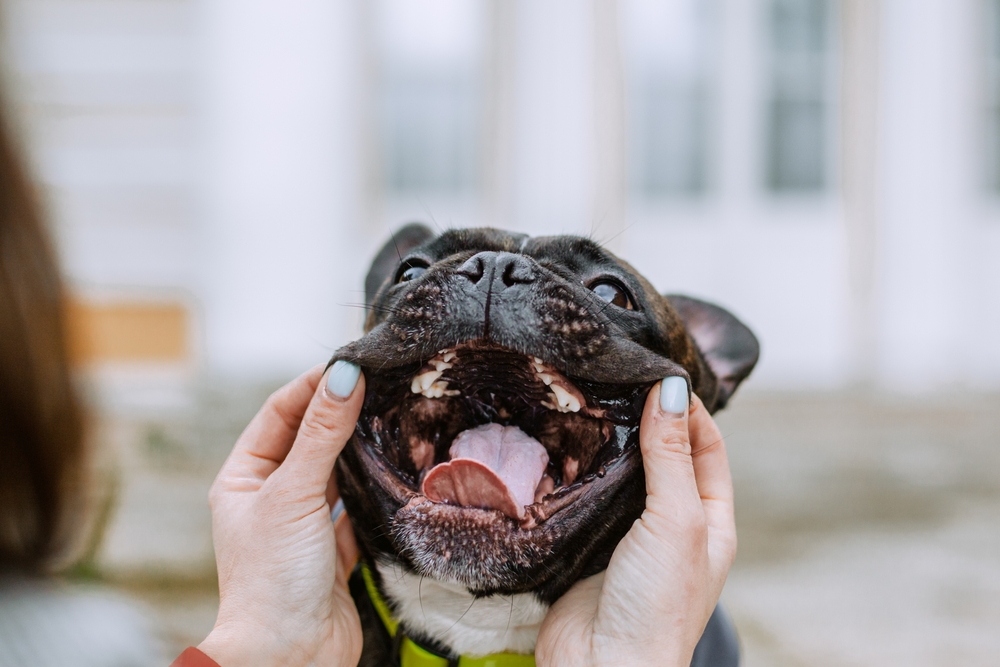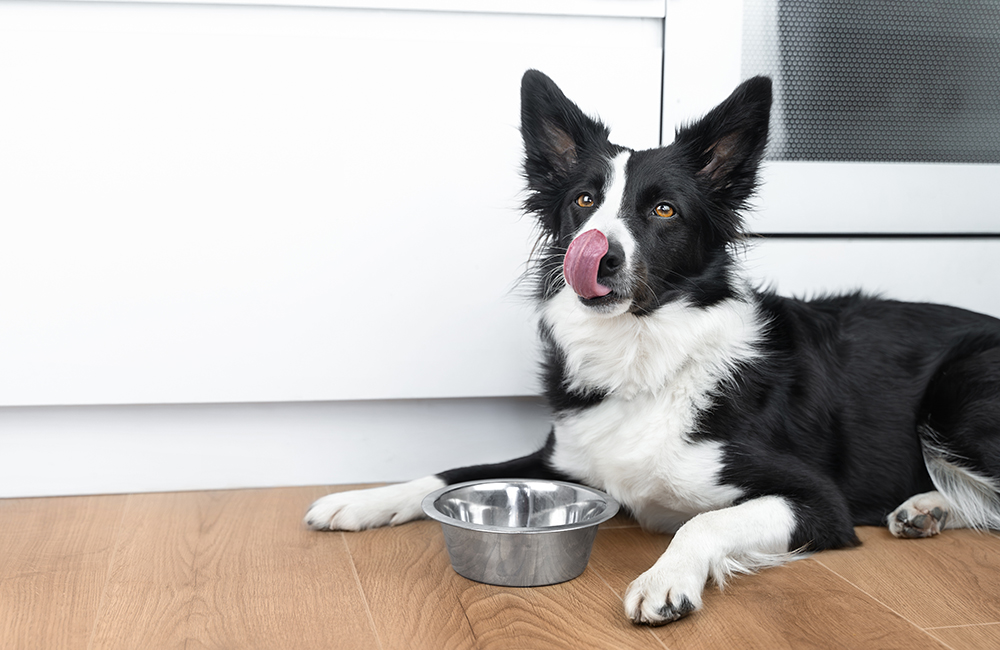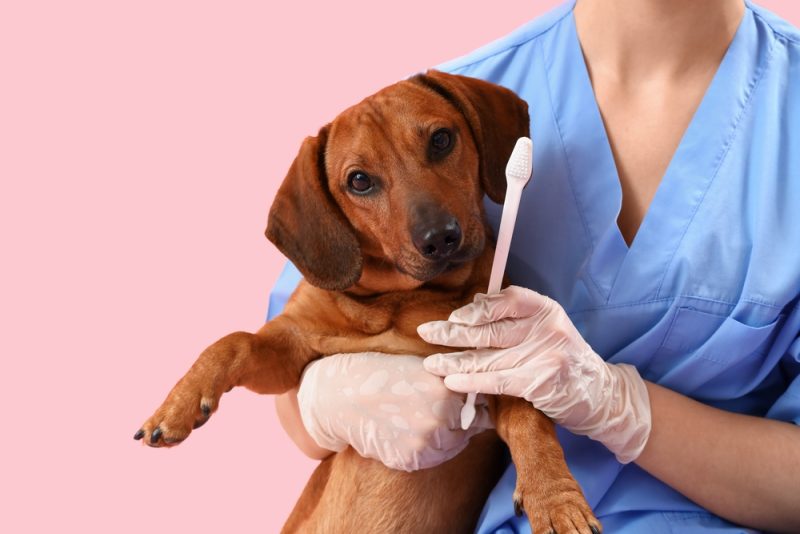Original Article: https://www.dogster.com/dog-health-care/why-does-my-dogs-breath-smell-like-fish
Click to Skip Ahead
We’ve all encountered some bad dog breath. While it’s considered common for your dog’s mouth to smell a little, if you notice a change in the smell, it can be a sign of illness or a problem with bad dental hygiene. In particular, if their breath smells of fish, this is often associated with problems including dental disease, kidney or liver problems, diabetes, or a poor diet.
Below, we look at some of the possible causes of fishy breath in dogs, along with other signs to look for and what actions you can take. We also look at some remedies and solutions that might help improve your dog’s breath.


The 5 Causes of Fishy Breath
Dogs and minty-fresh breath usually aren’t mentioned in the same sentence, but that doesn’t mean it should be considered normal for a dog’s breath to smell so foul that you can’t stand to approach them. A fishy odor is a strong smell, and it is one that you wouldn’t generally expect from a dog’s mouth. Therefore, it is worth investigating. Here are some of the possible causes of this smell.

1. Poor Dental Hygiene
Your dog can’t brush their own teeth, so it’s very easy for accumulations of plaque and tartar to take over. Dental treats and other products can help, but they often work better when used in conjunction with a good tooth brushing schedule.
You should brush a dog’s teeth every day if possible, otherwise do the best you can but shoot for at least once a week. There are many different types of toothbrushes and doggy toothpaste available that are effective and safe. You will also need to take your dog to the vet to have their teeth and gums checked out every 6=12 months.
Signs of poor dental hygiene include staining of the teeth, damaged or missing teeth, and redness of the gums. If poor dental hygiene has led to dental problems, your dog might exhibit signs of pain and distress while eating.
If you do see signs of dental disease, take your dog to the vet and have them checked over. You should also start brushing regularly, and you may need to change their diet if your dog is struggling to eat the food you’re providing.
2. Dietary Issues
If you’ve recently changed your dog’s diet, this could be the cause of the bad smell. Your dog might be eating poop, either out of a litter tray, from the yard, or even while out on walks, if you’re not paying full attention. It could also be eating from the trash which might be causing the smell.
Ensure you buy a good quality food that provides all of the nutrients your dog requires. Try to keep them from eating things that they shouldn’t, including human food.

3. Diabetes
Diabetes occurs when a dog’s body either doesn’t produce the insulin it needs or doesn’t respond properly to the insulin that is there. This can lead to high blood sugar levels and lack of available energy for the cells of the body.
Typical signs of diabetes include increased urination, increased thirst, and weight loss. The vet will take a blood test to check blood sugar levels, and if your dog is found to have diabetes it will likely need regular insulin injections.
As with diabetes in humans, lifestyle changes can help manage diabetes, and this may mean putting your dog on a diet, ensuring they get enough exercise, and avoiding the feeding of human food, even in small amounts. Your dog must be seen by a vet if you suspect diabetes is the cause of bad breath because left unmanaged, it can be fatal.
4. Kidney Problems
The kidneys remove toxins, regulate blood pressure, and help prevent water loss.
Signs of kidney problems include excessive drinking and larger volumes of urine, vomiting, not eating, and weight loss. There may be ulcers and sores in your dog’s mouth as well.
The vet will take blood tests and conduct a urinalysis to help determine whether a dog has kidney disease, and likely treatments include dietary management and medications.

5. Liver Disease
The liver is another essential organ. It deals with food digestion and the storage of vitamins and minerals. It also removes toxins. Liver disease can include a wide variety of signs from reduced energy to a loss of appetite. In extreme cases, your dog might have bloody diarrhea or vomit, a painful abdomen, and yellowing of the skin.
If you believe your dog is showing signs of liver disease, you should visit your vet where they will conduct blood and urine tests for diagnosis. Treatment of the condition with a specific diet or by incorporating supplements into your dog’s daily nutrition is often effective.
 What to Do About It
What to Do About It
Depending on the problem and its severity, there are some steps you might be able to take at home to help improve your dog’s breath and the underlying cause of the problem.
Consult a Vet
You should make an appointment to see your vet as soon as possible. They will conduct tests to determine the cause, and they can advise if a different diet might be the best solution.

Clean Teeth and Gums
If your dog is showing signs of dental disease, it isn’t too late to start brushing your pup’s teeth, but it’s best to start with a dental exam and professional cleaning first. This will help ensure that any severe problems are managed before you take over the maintenance of a healthy mouth.
Change Diet
If you’ve recently changed your dog’s diet, this might be the cause of bad breath. This is especially likely if the new food you are giving contains fish or fish-based ingredients. A lot of commercial dog food does contain fish because, as well as being a good source of protein, fish also provides omega fatty acids, and a host of other beneficial vitamins and minerals.
When changing a dog’s diet, you should do so gradually by introducing a small amount of the new food to their existing food and increasing the ratio of new food to old food over the course of a couple of weeks. This can help prevent diarrhea and other digestive problems.

Feed Supplements
If your dog is lacking in any essential vitamins and minerals, you don’t necessarily have to change their diet to hit all the necessary levels. Dogs can benefit from supplements like people can, just be sure to talk to your vet first to make sure supplements are necessary and that you’re giving the right amounts.
 Conclusion
Conclusion
Dogs aren’t known for having minty-fresh breath, but that doesn’t mean it should smell overly bad, either. Strong oral odors can be a sign of poor health, a bad diet, or dental disease.
Watch for other signs that your dog might be ill and consult a vet to help decide on the best course of action.
Featured Image Credit: UfaBizPhoto, Shutterstock
Source: Dogster












